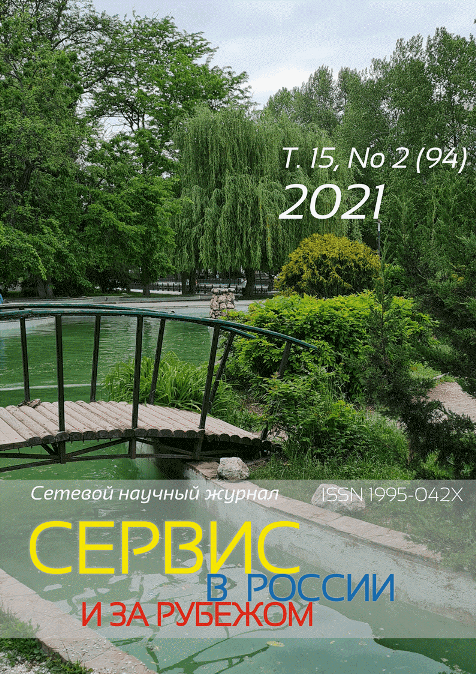Educational opportunities of virtual tourism
DOI:
https://doi.org/10.24412/1995-042X-2021-2-45-56Keywords:
virtual tourism, educational opportunities, theory of generations, subcultures, virtual services, KareliaAbstract
The article is devoted to the study of the educational potential of virtual tourism. Virtual tourism is increasingly used in the practice of both tourism and educational organizations. It is specially important for people with disabilities. The study is aimed at researching the concept of virtuality, the potential for the virtual services development in the field of tourism using the example of the Republic of Karelia and identify their educational opportunities, which can be used both for the development of the tourism sector and in the practical training of students of a tourism university in the future field of activity. The prospects for the virtual tourism development, its relevance, goals are indicated. A review of projects in the field of virtual services in the tourism sector of the Republic of Karelia has been completed. The educational possibilities of virtual tourism projects are determined, their relevance is substantiated within the framework of the «theory of generations». Generations Alpha and Zeta combine the concepts of «digitalization» and «interactive interaction», combined with immersion in the virtual world, which can be used for educational purposes through the formation of network communities that connect participants with common interests. Similar interests in relation to virtual tours lead to the formation of virtual subcultures that unite people from different countries of the world and make it possible to implement services for virtual check-in at a hotel and chatting with guests «living» in it, on virtual excursions, both popular and difficult. available tourist facilities. The results are presented as a generalization of the educational opportunities for the implementation of virtual tour services and will be useful both in the organization of industrial practice in a tourist university and in their application by employees of tourist, hotel and museum organizations.
Downloads
References
Dede С. Immersive interfaces for engagement and learning // Science. 2009. Iss. 323. P.66. DOI: 10.1126/science.1167311.
Егорова Е.Н. Виртуальный туризм как новое направление деятельности туристских организаций // Colloquium-journal. 2020. № 9-6 (61). С. 25.
Egger R., Buhalis D. E-Tourism Case studies: Management & Marketing issues in eTourism. Butterworth Heinemann Oxford, 2008. DOI: 10.13140/2.1.1225.5048.
Иванов В.Д., Бардина М.Ю. Виртуальный туризм – образовательные возможности // Физическая культура. Спорт. Туризм. Двигательная рекреация. 2020. Т.5. №2. С. 103–106.
Колесникова Н.В. Плотникова В.С. Обучение студентов туристских вузов проектированию виртуальных экскурсий // В сб.: «Научно-образовательная информационная среда XXI века»: Мат. X Всеросс. науч.-практ. конф. Петрозаводск. 2016. С. 90–93.
Корнилов Ю.В. Иммерсивный подход в образовании // АНИ: педагогика и психология. 2019. №1(26). С. 174-178. DOI: 10.26140/anip-2019-0801-0043.
Латыпов И.А. О некоторых философских аспектах формирования субкультуры виртуального туризма: его новая история или только «Story»? // Современные проблемы науки и образования. 2014. № 2. С. 633.
Лоза А.А., Егорова Е.Н. Тенденции и перспективы развития VR- туризма во время кризиса и пандемии 2020 // Colloquium-journal. 2020. № 23-2 (75). С. 47-48.
Межевникова О.П., Ухина Т.В. Виртуальный туризм: за и против // Сервис в России и за рубежом. 2020. Т.14. №3. С. 6-14. DOI: 10.24411/1995-042X-2020-10301.
Плотникова В.С. Проектирование экскурсионных услуг. Петрозаводск: ПетрГУ, 2018. 58 с.
Плотникова В.С., Дворжицкая А.Л. Иммерсивные экскурсии: проект «Черное и Белое» // Туризм и гостеприимство. 2020. № 2. С. 36-43.
Плотникова В.С., Колесникова Н.В. Эмоционализация экскурсионного пространства // Инновации в экскурсионной работе: концепции, технологии, практика: Монография / Под ред. О.Е. Афанасьева. Москва-Берлин : Директ-Медиа, 2020. С. 61-81.
Richards D., Taylor M. A Comparison of learning gains when using a 2D simulation tool versus a 3D virtual world: An experiment to find the right representation involving the Marginal Value Theorem // April 2015. Computers & Education, 86. DOI: 10.1016/j.compedu.2015.03.009.
Tilhou R., Taylor V., Crompton H. 3D Virtual Reality in K-12 Education: A Thematic Systematic Review // Computer Science. 2020. DOI: 10.1111/j.1467-8535.2008.00900.xCorpus.
Hew K., Cheung W. Use of three-dimensional (3-D) immersive virtual worlds in K-12 and higher education settings: A review of the research January. 2010 // British Journal of Educational Technology. Vol. 41(1). Pp. 33–55. DOI: 10.1111/j.1467-8535.2008.00900.x.
Хуусконен Н.М., Плотникова В.С. Интерактивное обучение как средство реализации требований ФГОС (на примере опыта кафедры туризма Петрозаводского государственного университета) // Школа будущего. 2015. №5. С. 258-266.
Downloads
Published
How to Cite
Issue
Section
License
Copyright (c) 2021 Plotnikova, V. S.

This work is licensed under a Creative Commons Attribution-NonCommercial-ShareAlike 4.0 International License.












